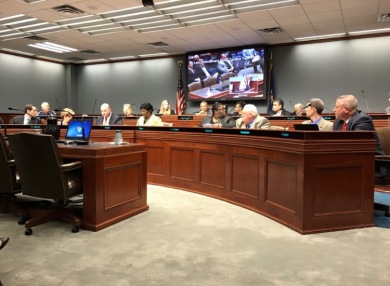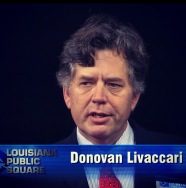by Jacob Lundy
As always, FOP New Orleans strives to keep members ahead of the curve when it comes to changes in law and policy; both of which seem to occur with considerable frequency in recent years.
As all members of the New Orleans Police Department are aware; we have yet to see any of our body worn camera videos on the evening news. Whether you think that’s a good or a bad thing, it is likely to change in the future. Given events in Chicago over the past several months, combined with the general direction of criminal justice transparency it seems likely that all body worn camera-equipped agencies nationwide will be forced to contend with the public’s desire to see what all these cameras are recording sooner or later. NOPD, for good reason, hastened the implementation of body camera use for the obvious benefits they provide to both police officers and citizens. Clearly, the idea was to get body cameras out into the field as quickly as possible and revisit aspects of Policy 447 (BWC) as needed. As with an ever increasing number of other states, Louisiana state law may soon dictate how and when such videos are made available to the public – among a number of other issues related to managing a body worn camera program.

The State Legislature has convened a body worn camera task force with the aim of submitting a final report on a variety of concerns related to the possibility of state-wide implementation of body worn cameras. As you might expect, FOP has a seat on the Louisiana Legislature Law Enforcement Task Force for Body Camera Implementation.
While body worn cameras are nothing new to NOPD; public release of footage would add another dimension to the now ubiquitous workplace devices and FOP intends to prepare its membership for the corresponding challenges. While a finalized state law could be quite a ways down the road, NOPD continues to transform into an agency of national firsts; FOP would not be surprised to see the department blaze its own trail ahead of the legislature in this arena. Regardless, FOP New Orleans would suggest officers assume today that all videos generated will be subject to public viewing. All of us at NOPD have been working over the past two years with the understanding that all issues of policy and law, from courtesy to use of force, can and will be reviewed via body camera footage by PIB, the FBI, FIT, OCDM, and the IPM (I believe that’s all of them). The men and women of NOPD have embraced the technology and far exceeded expectations in both implementation and performance. Regardless of the department’s exceptional performance, under any new public release law or policy a primary concern of lodge attorney Donovan Livaccari are the implications of actions and statements made between officers during and immediately following critical incidents which were formerly analyzed only by field experts. Members are reminded that a side effect of such transparency is that your actions are likely to be subjectively analyzed, often out of context, by any number of pundits for whom controversy = revenue. Your detractors are not necessarily influenced by the guiding principles of Graham v. Connor. Officers should remain cognizant that all statements made immediately following highly stressful encounters on body camera are indelible and have the ability to shape post hoc analysis of critical incidents. There is really no reason to be ambiguous on this topic; while engaged in the scope of your employment, should you become involved in a major use of force, however justified, you will become a de facto suspect in a criminal investigation. This is a practical FYI for all FOP members who are negotiating a rapidly changing law enforcement environment where literally everything you say and do is recorded – and may soon be at the top of the 5 o’clock news. FOP representatives will be making the rounds in the near future to discuss legal, privacy, and policy concerns with members.

First meeting of the State Legislature Body Camera Task Force
As referenced above, the Louisiana Legislature created the Louisiana Legislature Law Enforcement Task Force for Body Camera Implementation in late 2015 which is comprised of various experts from state and local law enforcement, attorneys, ACLU and NAACP representatives, mayors, Darrell Basco (President of the Louisiana FOP), and is chaired by Franz Borghardt (criminal defense attorney, Baton Rouge). I spoke with Chairman Borghardt in Baton Rouge following the first meeting of the committee for some background and details on the work ahead, keeping in mind any eventual state legislation will certainly apply to NOPD and guide our continued use of the technology.
Chairman Borghardt on the creation of the task force; “the legislature, in HCR 180 (2015 R.S.), created the task force to study and make recommendations regarding requirements for the development and implementation of policies and procedures for the use of body cameras by law enforcement. This came from a House concurrent resolution by Representative Honore and Senator Broome as a response to legislation that was proposed to mandate, by law, the required use of the devices. The task force’s continued existence is governed by resolution and the task force itself serves at the pleasure of the Louisiana Legislature.” Borghardt continued, “the ultimate goal of the task force is to make an informed and well thought out proposal to the Louisiana Legislature with regard to the implementation and use of body cameras in Louisiana. This includes policies and procedures on implementation, considerations for privacy rights and officer safety, effects on public records law, data storage, and cost considerations.”
To-date the task force has met once for public discussion, a review of the goals of the committee, and homework was assigned to all members for research and input from their respective bodies/agencies to be submitted at future meetings. The committee will reconvene in March 2016.

Some early discussions of the committee have been focused on a constitutional issue surrounding any mandate that all agencies in Louisiana implement body cameras; under Louisiana’s constitution, the state cannot mandate municipalities implement body cameras without paying for them. I think everyone would agree the state is in no position financially to pay for several thousand body cameras and incur the cost of maintenance and storage. The state does have the option of something called an unfunded mandate, meaning the legislature could require municipalities to implement body cameras at their own cost; those that do not would have state funding in some other area cut (remember when the federal government “suggested” Louisiana raise the drinking age from 18 to 21 or they would cut federal highway dollars = unfunded mandate). This avenue seems unlikely, however. On this particular issue, committee Chairman Franz Borghardt said “legislation that creates an unfunded mandate would likely be something that all parties involved would like to avoid.” What route the state takes in requiring or suggesting all police agencies adopt body cameras remains to be seen, Borghardt identified “long term cost of data storage” as one of the biggest perceived obstacles to state-wide implementation.
Beyond state mandates and associated costs, the most contentious item seems to be the host of privacy issues that surface with body camera use. This includes everything from front-end privacy concerns (can a citizen request an officer turn off his/her camera in their residence, filming in hospitals/schools, etc.) to back-end issues such as release of videos pursuant to records requests – the committee is also discussing whether our current public records law infrastructure would apply to camera footage as-is.
 Recently committee Chairman Franz Borghardt, Louisiana FOP President Darrell Basco, and others appeared as panelists on the Louisiana Public Square television show in Baton Rouge to discuss the committee’s work and common concerns about body cameras. FOP New Orleans also participated in the discussion on behalf of members to voice lodge concerns. We recommend viewing the show to get a state-wide gauge for the direction of body cameras in Louisiana (watch the show by clicking this link).
Recently committee Chairman Franz Borghardt, Louisiana FOP President Darrell Basco, and others appeared as panelists on the Louisiana Public Square television show in Baton Rouge to discuss the committee’s work and common concerns about body cameras. FOP New Orleans also participated in the discussion on behalf of members to voice lodge concerns. We recommend viewing the show to get a state-wide gauge for the direction of body cameras in Louisiana (watch the show by clicking this link).

In addition to formulating FOP’s official position on specific points on the commitee’s agenda, FOP President Basco cautioned the committee against hasty legislation that could potentially negatively impact both officers and the public. President Basco is advocating for a thorough review of existing state law elsewhere; the successes and failures of legislation in other states, carefully considering Louisiana’s privacy concerns, and preparing a proposal for a future session so that all members of the committee feel confident in any end result legislation.

All members of the task force, including the FOP, are sourcing model legislation and existing research and data for submission to the committee. Representatives from New Orleans will also be giving a presentation to the committee on our city’s two years of experience with body worn cameras including the various pros and cons over that time.
Members wishing to see the direction other states have paved in this area can refer to The Reporter’s Committee for Freedom of the Press site which includes an interactive map with links to each state’s body camera laws (both existing and in-progress legislation). Also worth reading; the Department of Justice/Police Executive Research Forum study “Implementing a Body-Worn Camera Program; Recommendations and Lessons Learned”.
Regardless of existing data and research, Chairman Borghardt appropriately points out that “it is evident that the implementation of body cameras, in as much as policy and procedures can be enacted, will also require organic growth in understanding unforeseen issues with their use.”
As FOP New Orleans’ policy chair, I can report with confidence from the legislative committee to ongoing discussions in Baton Rouge; there is overwhelming support for body cameras across Louisiana but no consensus on when and how videos should be made public.
Additional articles/studies and relevant law can be found in the hyperlinks below;
Louisiana Title 44.1 et seq Public Records Louisiana Revised Statutes
7 Findings from First Ever Study on Body Cameras PoliceOne.com
Growing use of Police Body Cameras Raises Privacy Concerns Los Angeles Times
Use of Force Reporting Guide and Checklist Signal108, Donovan Livacarri






 Recently committee Chairman Franz Borghardt, Louisiana FOP President Darrell Basco, and others appeared as panelists on the
Recently committee Chairman Franz Borghardt, Louisiana FOP President Darrell Basco, and others appeared as panelists on the 


